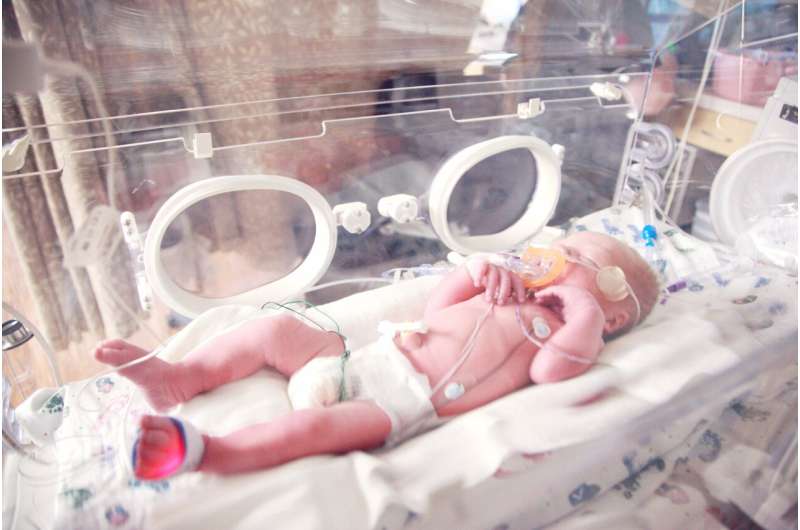

.
Preterm babies do not get utilized to duplicated discomfort in the manner in which full-term babies, kids and grownups do habituate to discomfort, discovers a research study led by UCL (University College London) scientists.
The authors of the brand-new Existing Biology paper state that if preterm babies have not yet established the system that makes it possible for individuals to get utilized to moderate discomfort, medical treatments in their very first couple of weeks of life might possibly affect their advancement.
Lead author Dr. Lorenzo Fabrizi (UCL Neuroscience, Physiology & Pharmacology) stated, “The manner in which we can get utilized to things can be viewed as the easiest example of behavioral and brain plasticity, and it is a standard part of memory and knowing. Discomfort habituation is essential since it allows us to protect physical, psychological, and cognitive resources by not overreacting to discomfort that is inevitable or not dangerous.
” Our findings recommend that the capability to get utilized to duplicated discomfort may establish throughout the 3rd trimester of pregnancy, so that infants born too soon have actually not yet established this capability that full-term children have right from birth.”.
The research study included 20 babies at University College London Health Centers (UCLH). Half of them were preterm (and checked while still more youthful than 35 weeks gestational age), while the other half were either born at complete term (7 babies) or preterm however evaluated at term age (3 babies). The 2 groups were similar in regards to their real postnatal age, as the preterm children had a typical age of 14 days, compared to 10 days amongst the full-term (or term age) group.
The scientists were determining the babies’ actions to an unpleasant however medically needed heel lance ( blood test), which was carried out two times (3 to 18 minutes apart) for each baby (2 lances are often needed to gather sufficient blood; this is not required for many babies so just those that required a 2nd lance were consisted of in the research study).
Heel lances can generate significant discomfort reactions in babies, however it was not formerly understood whether this reduces on duplicated lances. To comprehend this, the scientists taped the babies’ brain activity with EEG (electroencephalography) electrodes put on the scalp, and their heart rates utilizing ECG (electrocardiography), while likewise monitoring their facial expressions and reflexes in withdrawing the leg.
The scientists discovered that the brain activity was not as strong instantly after the 2nd heel lance, compared to the very first, recommending a habituation reaction, however this was just the case for full-term babies. They discovered a comparable pattern for heart rate and facial expressions, as preterm babies responded simply as highly to both heel lances, while the full-term babies appeared to habituate to the discomfort.
The group states this habituation action may be due to the full-term babies expecting the impending discomfort when they get a 2nd heel lance, so their response is less noticable, or it might rather or in addition be because of their brains regulating their reflexive survival actions.
They include that habituation to discomfort may secure the full-term babies, however not those who were pre-term, from possible effects to their advancement.
Very first author Dr. Mohammed Rupawala (UCL Neuroscience, Physiology & Pharmacology) stated, “While undesirable and agonizing medical treatments are essential for numerous young babies, there is the prospective to affect their advancement, such as by transformed discomfort understanding, or possibly minimized noodle or interfered with white matter in the brain.”.
Co-author Dr. Judith Meek, expert neonatologist at UCLH, stated, “This work raises awareness of the additional vulnerability of early children to discomfort Clinicians require to do their finest to secure them from duplicated uncomfortable experiences. This must be considered as an important element of brain oriented newborn care.”.
Note: Gestational age describes the weeks expired given that the start of the mom’s last menstruation. The 10 babies categorized as preterm in this research study had an average gestational age of 31 weeks, so they were still in developmental phases usually gone through while still in the womb.
More details:
Lorenzo Fabrizi, A developmental shift in habituation to discomfort in human neonates, Present Biology(2023). DOI: 10.1016/ j.cub.202302071 www.cell.com/current-biology/f … 0960-9822(23)00244 -0
Citation:.
Preterm children do not habituate to duplicated discomfort, reveals research study (2023, March 16).
recovered 16 March2023
from https://medicalxpress.com/news/2023-03- preterm-babies-habituate-pain. html.
This file goes through copyright. Apart from any reasonable dealing for the function of personal research study or research study, no.
part might be recreated without the composed authorization. The material is offered info functions just.
Be the first to comment